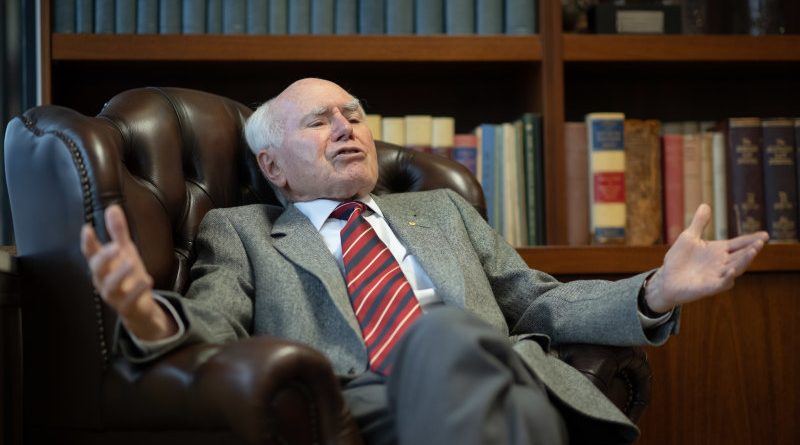Olympics of centre-right thought? Heavyweights to debate future of conservatism in the age of Trump
Save articles for later
Add articles to your saved list and come back to them any time.
It has been described as the Olympics of centre-right thought; the Davos of conservatism. But former prime minister John Howard wouldn’t go that far.
While Davos is heavily economic, a star-studded, conservative pow-wow in London beginning on Monday and attended by more than 100 Australians will focus on how the centre-right of politics can redefine its values and reclaim the social agenda.
Former prime minister John Howard is optimistic about the future of conservatism. “People still react to incentive, security – those concepts are still relevant”Credit: Wolter Peeters
“It responds to a feeling that many people have, that the left has had a free rein with this cultural stuff,” Howard said.
These fast-moving times are shaky ground for conservatism. People are losing faith in institutions; the church no longer has moral influence; the social norms that once tied the community together are changing at lightning speed. Even many within the centre-right acknowledge the movement is on the back foot and has been left scrambling to define itself by what it opposes rather than what it believes.
“I think there is some legitimacy to that criticism,” says John Anderson, the deputy prime minister during the Howard years and one of the initiators of the conference alongside controversial psychologist Jordan Petersen. Anderson believes the West has reached a “civilisational” moment. “[The West] is plagued by self-doubt and confusion. We are being challenged; what do we believe in? What will we stand up for?”
“We are looking to share the best thinking we can muster on how we can, if you like, regroup, and put forward a positive agenda.”
Leading symbol of a disintegration of the right into grievance culture? Controversial psychologist Jordan Petersen is one of those behind the London conference.Credit: Getty
The three-day Alliance for Responsible Citizenship conference begins in London on Monday. Howard, Anderson and former prime ministers Tony Abbott and Scott Morrison will be there. So will former NSW premier Dominic Perrottet, and Catholic Archbishop Anthony Fisher. Federal MPs Amanda Stoker, Angus Taylor, Jacinta Price and Andrew Hastie will also attend.
Another attendee, Liberal powerbroker and Sydney Catholic Schools chief executive Dallas McInerney, says the conference has the potential to redefine the movement. “The centre right is trying to work out what its north star is,” he says. “How do you push back against the hyper-progressivism that’s taking hold and being reflected in policies around the world? What is it that we can articulate that we favour, promote and will endorse, as opposed to oppose and tear down?
“How do you get humanity similarly orientated on progress, good instincts, a global orientation for what’s right or wrong, if you don’t have religion? What takes its place? If [the conference] can push the centre right globally – and by extension, the Australian centre right – to be more intentional in terms of what it can promote and produce for the next generation, that’s going to be beneficial.”
Former prime ministers Tony Abbott and Scott Morrison will attend the conference.Credit: Alex Ellinghausen
Not everyone, however, is as optimistic. Critics – including some who are attending – spoke on the condition of anonymity; they didn’t want to look like scrooges. One described it as a “sausage fest”. Another worried that it was too Christian. One said while they supported the idea – “we want a positive way forward, not Trumpist, not full of grievance” – they weren’t sure how the conference was going to achieve it.
“There’s no new angles, new names, new scholars,” the critic said. “They’re not really saying how it’s going to show a way forward. They’re getting like-minded people together – it’s all the same people. The same columnists, the same politicians from the centre right.”
A question repeated by several critics of the conference was, ‘Why Jordan Petersen?’ Said one, “Isn’t he a leading symbol of a disintegration of the right into grievance culture?”
Anderson says Petersen was one of the originators of the idea to hold a conference and approached him for support. “He has a very broad mind,” he says.
Howard believes “there is a place for gatherings from time to time, which bring together people that think western civilisation is a pretty good thing.” But he is less pessimistic than others about the future of conservatism.
“People still react to incentive, security – those concepts are still relevant,” he said. Howard added that the centre right didn’t always do a good job of articulating its values, but then “[neither] does the Labor Party. I think the centre right sometimes does well and sometimes does very poorly. Clearly, because we’re out of office … we need to lift our game.”
Howard is not perturbed by recent research from the Centre for Independent Studies suggesting the adage, ‘If you’re not a liberal when you’re 20, you have no heart. If you’re not a conservative by the time you’re 40, you have no head’, may no longer hold, as Gen X and Millennial voters are no longer drifting to the right as they age. “I don’t think any of those things hold forever,” he says. “But once again, there’s always a rush in politics, particularly in the commentary, to say ‘well this is a decisive moment’. I think trends are trends over time.”
Nor is he worried young people will reject conservatism because they have little – like homes of their own, for example – to conserve. “Not everybody now wants to buy a house,” he says. “You shouldn’t make the mistake of seeing conservatism as a static retention of the status quo. It can mean hanging onto what’s worked, and being reluctant to change to something unless you know it’s going to be better.”
ARC founder Baroness Philippa Stroud said the conference aims to create a movement of friends committed to an AUKUS of ideas. “I would say [conservatives are] still very, very broad but the ideas space has become a very aggressive one,” she said.
Baroness Philippa Stroud with former deputy prime minister John Anderson in London. Anderson believes the West has reached a “civilisational” moment.
“This is why you need a movement of people because it takes very courageous people to hold your own in the ideas space now and I do think courage is going to be the virtue required going forward.” Asked if Donald Trump, who could return to the US presidency, represented any of the goals of ARC, Stroud simply said: “No.”
As for predictions, the ARC will be little more than a talk-fest. Anderson admits there’s no easy answer to these existential questions. “We will try to have a declaration of some of the things that jump out at us at the end of it,” he says. “Hopefully, a road map. I’m sincerely hoping it will be useful for politicians from the various countries to get to know people from other sides, and also to expose themselves to really good thinking.”
Cut through the noise of federal politics with news, views and expert analysis. Subscribers can sign up to our weekly Inside Politics newsletter.
Most Viewed in National
From our partners
Source: Read Full Article






